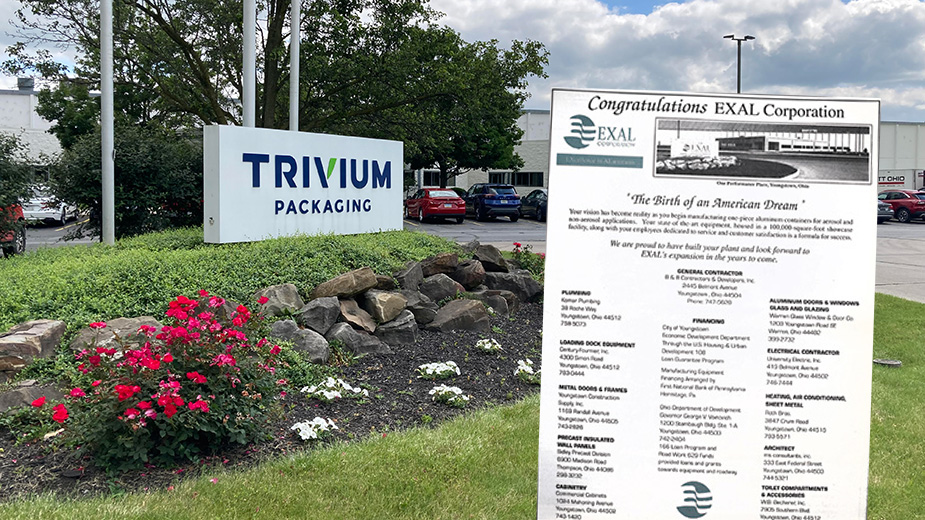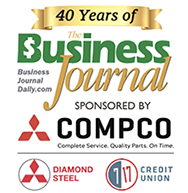YOUNGSTOWN – On Oct. 29, 1993, Gov. George Voinovich led a host of political and business dignitaries in a ribbon-cutting at Exal Corp.’s new 100,000-square-foot plant in Youngstown’s Performance Place industrial park, where it would fabricate containers for the beverage, aerosol, home products and personal care industries.
A second computer-installed assembly line was being installed that week, with a total of five assembly lines expected to be in operation by 1996.
“When I dreamed of this thing, it was nothing,” Exal President Delfin Gibert said as the manufacturer was completing its first order – slim aluminum containers for a hairstyling product. “All we had was the land and we didn’t have the finances. But here we are. The plant is built. And we want to be a model company in every respect.”
In the 30-plus years since then, the plant has manufactured billions of aluminum containers for national brands such as Coca-Cola, Pepsi, Budweiser, Dove, Pledge, Smucker’s, Bayer and Kraft.
Today, what began as Exal is owned by Trivium Packaging, a Netherlands-based company with annual revenue of $3.1 billion. The plant in Performance Park is one of 60 Trivium operates worldwide; its workforce here is among the company’s 7,300 employees.
Gibert, a native of Spain, learned the aluminum can business while employed at Advanced Monobloc in Hermitage, Pa., one of two aluminum aerosol plants that competed with Exal.
In 1993, the Ohio Department of Development supported plant construction – an estimated $17 million project – with a $3 million low-interest loan and a $100,000 grant to the city for road improvements to provide access to the 135-acre abandoned industrial site that the city acquired from LTV Steel.
“The opening of this plant is unique because it underscores we’re in a global marketplace,” Voinovich said at the ribbon-cutting. “Here we have an entrepreneur from Spain, equipment manufacturers from Germany and Italy, and the city, state and private enterprise getting together to create jobs and make a product that’s going to compete worldwide.”
Shortly thereafter, on Jan. 26, 1994, Youngstown City Council approved a one-year loan for $500,000 at 1% interest to support plant expansion for a third assembly line, which was happening sooner than had been anticipated.
“They weren’t supposed to be installing a third line for at least six more months,” said Jeff Chagnot, then city director of economic development.
By the third quarter of 2001, Exal had outgrown its 100,000-square-foot building. In August of that year, the manufacturer said it would build a 75,000-square-foot addition to phase in three more manufacturing lines.
The original building had been sized to accommodate five manufacturing lines, Brenda Oman, Exal vice president of finance and administration, said in the MidAugust 2001 edition of The Business Journal. Each line was capable of producing more than 30 million cans and canisters annually.
“We can’t keep up with demand right now,” Oman said.
Years later, in April 2010, Exal’s ownership changed, with its acquisition by investors led by Teachers Private Capital, a division of Ontario Teachers Pension Plan, and Stonebridge Partners Equity Fund IV. At the time, Exal produced approximately 1.3 billion units annually and generated annual revenues of $400 million, according to the announcement of the transaction.
“Delfin Gibert has built the leading global producer in its industry with strong leadership and a proven track record for growth. We are delighted to partner with the company at this important stage of its evolution,” Erol Uzumeri, senior vice-president, Teachers’ Private Capital, said in the news release. “We believe that with Exal’s international operations and strong, diverse client base, the company will benefit from our ability to support identified future growth opportunities in both established and emerging markets. We look forward to working with management to continue to build the company.”
An April 2018 story marking Exal’s 25 years of operation reported that it had grown to 14 production lines from the original one in 1993. The market for its products had never been better, said CEO Michael Mapes.
One of the plant’s original employees, Tom Chupak, director of research and development and innovations, said that innovation was “critical” to Exal. The company experiments with various alloys and shapes for containers to search for designs that make their customers’ products stand out, he explained.
“We have to develop an eye-catching container to meet the customer’s needs,” Chupak said. “We have to stay on top of new designs so customers can grab it off the shelf.”
About a year later, Exal, in conjunction with Boston Consulting Group, released a study indicating that a majority of Americans were willing to pay more for beverages with environmentally friendly packaging.
“The research shows us that being green isn’t just a trend,” Mapes said. “Consumers are translating their beliefs into action and are willing to speak with their wallets.”
In July 2019, Luxembourg-based Ardagh Group entered into an agreement to combine its food and specialty metal packaging business with Exal to form Trivium Packaging, creating “one of the largest metal packaging companies in the world,” according to a news release.
“In forming Trivium we are bringing together two leading businesses to create a global packaging company that is well positioned to capitalize on current market trends,” said Janet Rowe, executive managing director, equities, Ontario Teachers. “We are pleased to establish a partnership with Ardagh and believe our alignment on long-term value creation will be a critical driver for future success.”
By January 2022, Youngstown plant manager Michael Wood said Trivium was looking to add another manufacturing line here because of growing demand for sustainable packaging. At the time, the plant employed 300 and was projecting to hire 40 workers.
A few months later, during a Youngstown/Warren Regional Chamber event, Wood reported that the company was putting $40 million into the Youngstown plant and expected to hire 100 more workers in the next few years
“People don’t partner with us because we make cheap products. They partner with us because it’s quality, because it’s aluminum and it’s infinitely recyclable,” he said. “That’s why we’re going to be here for a long time because more and more folks continue to look for something that’s great for the environment.”
Trivium received further encouragement to grow here in January 2023, when the Ohio Tax Credit Authority approved a tax credit worth $725,000 to add two production lines to support retaining 394 positions and adding 93 over two years. Ohio was competing with New York and Virginia for the proposed expansion project.
At the time, Trivium’s vice president, global communications, Ann Halvorsen, said the company was “still in the process of finalizing the deal” to move forward with the two additional lines.
“Our estimated timing is for the first line to be installed and running by the end of 2023, with the second line expected by mid-2024,” she said.
In October 2023, city finance director Kyle Miasek presented details of a proposed job creation grant agreement with Trivium to City Council. The grant would provide a graduated rebate based on income taxes the company paid for the next few years.
Trivium representatives had met with city officials to discuss the company’s expansion plans and “asked if we could creatively come up with a plan that could assist them” with the proposed investments, Miasek said.
Five months ago, the Youngstown Board of Control approved a job creation grant worth about $277,000 to further support the expansion project.
Pictured at top: Trivium Packaging in Youngstown sits on Exal’s original site. Exal’s merger with Ardagh Group in 2019 created Trivium. Inset: This ad, paid for by Exal Corporation, was published in the MidNovember 1993 edition of The Business Journal.

